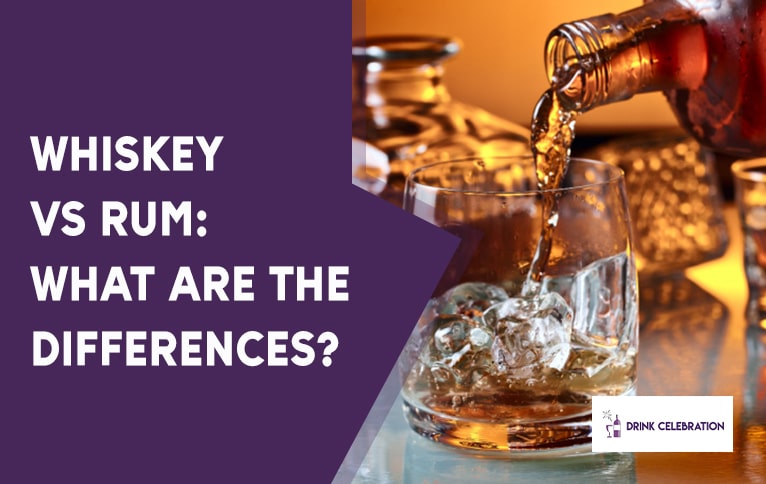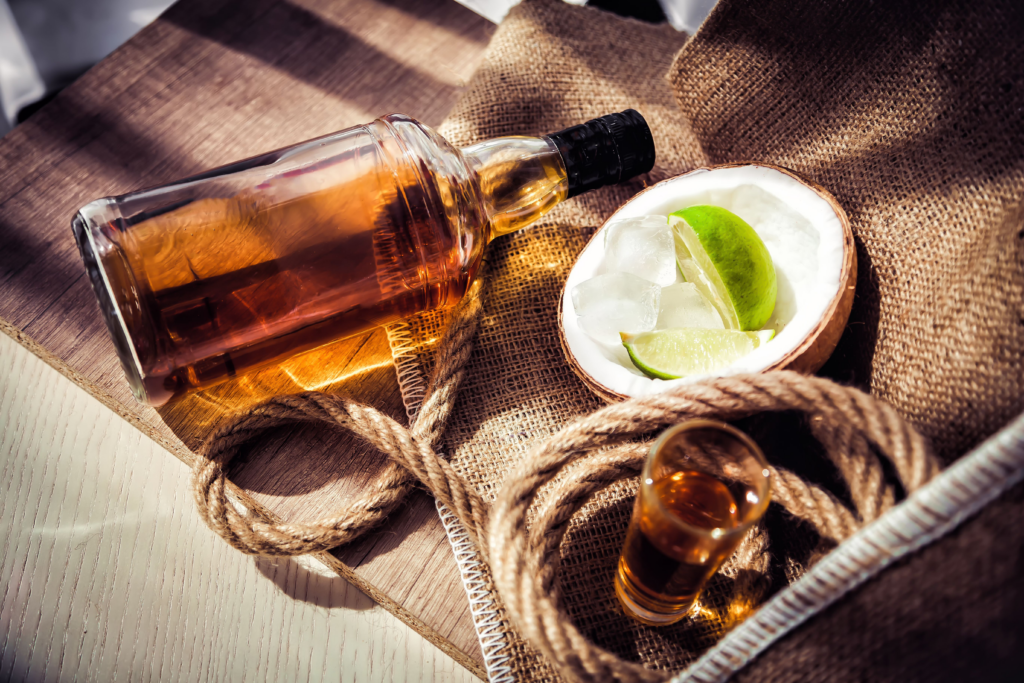Whiskey and rum are two trendy drinks, and both have gained immense importance and popularity worldwide in various alcoholic beverages.
The main difference between whiskey and rum is the fermentation process. Whiskey is made from grains (like rye, barely, etc.), while rum is made from sugarcane.
This article will discuss these two drinks’ origins, ingredients, production processes, and flavor profiles.

Whiskey vs Rum
Whiskey is typically made from fermented grains, such as barley, corn, rye, or wheat, and aged in wooden barrels. It often has a rich, complex flavor profile with notes of caramel, vanilla, and more. On the other hand, rum is made from sugarcane byproducts, such as molasses or sugarcane juice, and is aged in wooden barrels (like whiskey is). It tends to have a sweeter taste with hints of tropical fruits and spices.
Comparison Chart
| Whiskey | Rum | |
|---|---|---|
| Base Ingredient | Grains (corn, rye, etc.) | Sugarcane byproducts |
| Production Process | Fermented grains aged in wooden barrels | Distilled from sugarcane products, aged in barrels |
| Flavor Profile | Rich, caramel, spices | Sweet, fruity, spices |
| Popular Varieties | Scotch, Bourbon, Irish, Rye | Dark, White, Spiced, Aged |
| Color | Amber-gold-brown | Light to dark |
Whiskey Historical Background

Whiskey has a rich historical background. Of the many types, Scotch whiskey is one of the most popular. Its origins can be traced back to the 15th century in Scotland, where monks developed distillation techniques.
Irish whiskey also has a long history, dating back to the 6th century when Irish monks introduced the art of distillation to the country. Bourbon is another kind of whiskey, and it has its roots in the United States, specifically Kentucky.
Rye whiskey is another North American spirit., and it originated in the United States and Canada.
Rum Historical Background

Rum’s history is intertwined with the sugarcane plantations and trade routes of the Caribbean and Latin America. Sugarcane was introduced to the Caribbean by European colonizers in the 15th and 16th centuries, leading to the production of rum in sugarcane-growing regions.
Rum played a significant role in the economies of these regions, and it was exported worldwide during the era of sugarcane and slave plantations..
Ingredients and Production Process
Below is some key information about whiskey and rum production, including their primary ingredients and the distillation process. While there are many similarities between the two, there are also differences that make each type of alcohol what it is.
Whiskey Key Ingredients
Although each spirit is slightly different, the key ingredients that you’re going to find in whiskey include:
- Grains: Whiskey is primarily made from grains like barley, corn, rye, and wheat. The choice of grains varies depending on the type of whiskey being produced.
- Water: Water is another important ingredient as it plays a crucial role in whiskey production. It affects the flavor and quality of the final product. Water is used in mashing, fermentation, and dilution processes.
- Yeast: Yeast is also important as it is responsible for fermenting the sugars present in the grains (converting them into alcohol during the fermentation process).
Distillation and Aging
Any whiskey drinker knows that the distillation and aging process is incredibly important and varies from one type of whiskey to another. It can impact everything from the flavor to the aroma and the whiskey’s overall quality. But what exactly happens during this process?
Technically, distillation occurs when the mash is heated in a still, and the alcohol vapor rises and condenses into a liquid with a very high alcohol content.
After this distillation process is over, the whiskey is aged in barrels. There, it is transformed into the specific type of whiskey the producer wants. The barrel type adds flavor to the liquid during this process. Depending on the whiskey, it might be aged for a few years or even a few decades..
Rum Key Ingredients
Here are the key ingredients that make rum what it is:
- Sugarcane Juice: Some rum producers use freshly pressed sugarcane juice as the primary ingredient for their rum. This juice is extracted from the stalks of the sugarcane plant and contains natural sugars, water, and various nutrients.
- Molasses: Molasses is a byproduct of the sugarcane refining process. It is a thick, dark syrup obtained by extracting the sugar from the sugarcane juice. Molasses provides a concentrated source of fermentable sugars and provides the rum with its flavor profile.
- Yeast: Yeast is as important in rum as it is in whiskey. It is essential for fermentation. The sugar in the sugarcane juice or molasses is converted into alcohol. Different yeast strains can be used, each contributing to the development of unique flavors and aromas during fermentation.
- Water: Water is a crucial ingredient in rum production, used throughout the process, including diluting the sugarcane juice or molasses, adjusting the fermentation process, and eventually bottling the final product.
Distillation and Aging
The distillation and aging process for rum is similar, yet different, from that which is used for whiskey. The process helps the rum achieve its overall character, taste, and aroma, which sets one brand apart. First, the rum is distilled using pot stills or column stills (either of these will result in different final products).
Next, the rum is aged in wooden barrels, similar to whiskey barrels. These are usually made of oak and, like whiskey, heavily influence the final taste of the rum.
Rum is generally not aged as long as whiskey is, staying in its barrels for months to years. During this process, some rum evaporates.
Conclusion
Whiskey and rum are two distinct spirits that offer unique flavors and experiences. Whiskey, made from grains and aged in wooden barrels, presents a complex and robust flavor profile with notes of caramel and spices.
On the other hand, rum, derived from sugarcane byproducts and aged in barrels, offers a sweeter taste with hints of tropical fruits and spices.